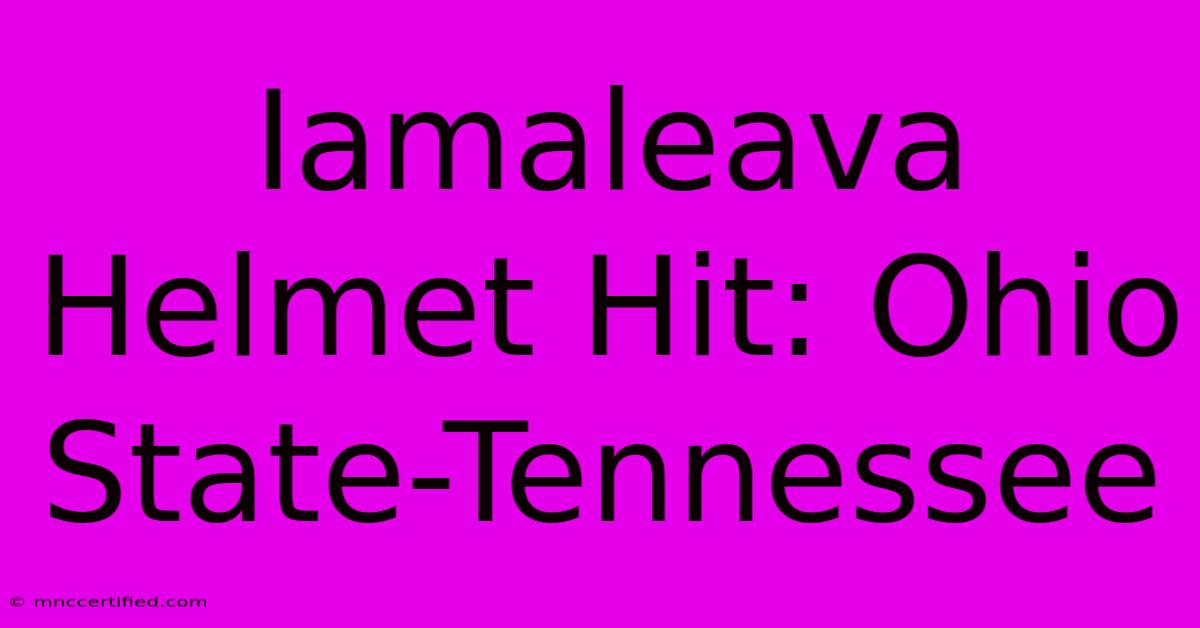Iamaleava Helmet Hit: Ohio State-Tennessee

Table of Contents
Iamaleava Helmet Hit: Ohio State-Tennessee - A Controversial Moment Analyzed
The 2023 College Football season kicked off with a bang, and one of the most talked-about moments from the early games was the controversial helmet-to-helmet hit on Tennessee quarterback Nico Iamaleava during the Ohio State-Tennessee game. This incident sparked a flurry of debate surrounding player safety, officiating, and the overall intensity of college football. This article will delve into the specifics of the hit, the subsequent reactions, and its implications for the future of the sport.
The Play: A Detailed Breakdown
The play itself unfolded quickly. Iamaleava, in a crucial moment of the game, took a snap and attempted a pass. An Ohio State defender, aggressively pursuing the quarterback, made contact with Iamaleava's helmet. The impact was significant, resulting in the quarterback momentarily staggering before being attended to by medical staff. The hit was deemed illegal targeting by many observers, but the on-field officials did not initially flag the play.
The Officiating Controversy: Why Wasn't it Called?
This is where the controversy really ignited. The lack of a penalty flag immediately after the hit on Iamaleava led to significant outrage from Tennessee fans and commentators alike. Many argued that the officials missed a clear violation of targeting rules, a call that could have dramatically shifted the momentum of the game. The debate centered around the interpretation of the rule itself and the consistency of its application across various games. Questions arose regarding the training and preparedness of officials to accurately judge such high-speed collisions in real time. The inconsistent application of targeting penalties is a long-standing issue in college football, and this incident highlighted that ongoing problem.
The Aftermath: Reactions and Implications
The Iamaleava helmet hit generated a wide range of reactions. Social media platforms exploded with discussions and debates about the play, the officials' performance, and the broader issue of player safety in college football. Coaches, commentators, and fans voiced their opinions, contributing to a heated public discourse.
Player Safety Takes Center Stage: A Call for Improved Protocols
The incident reignited the crucial conversation surrounding player safety in college football. The potential for long-term consequences from such hits is undeniable, underscoring the need for stricter enforcement of rules designed to protect players. The debate extends beyond just targeting calls; it encompasses the need for improved coaching techniques, enhanced player training, and a greater emphasis on fair play and sportsmanship.
Impact on the Game and Future Games
The absence of a penalty for the Iamaleava helmet hit directly impacted the game's flow. While it's impossible to definitively say how the game would have unfolded differently with a penalty, the missed call certainly left a lasting impact on the perception of the game's fairness. It served as a reminder of the significant influence officiating can have on the outcome of any given game, and the urgent need for greater consistency and accuracy in officiating. This incident will likely be scrutinized during future officiating reviews, leading to potential rule adjustments or improved training for referees.
Conclusion: Moving Forward
The Iamaleava helmet hit in the Ohio State-Tennessee game served as a stark reminder of the inherent risks in college football and the ongoing need for improvements in player safety protocols, officiating consistency, and the overall culture of the sport. The incident sparked a valuable discussion, and its implications will undoubtedly shape the future of how targeting is enforced and how player safety is prioritized within the NCAA. Ongoing efforts to refine the rules, enhance training for officials, and promote a more protective environment for athletes are crucial steps towards mitigating the risk of such potentially devastating injuries. The debate surrounding this play highlights that the fight for player safety is far from over.

Thank you for visiting our website wich cover about Iamaleava Helmet Hit: Ohio State-Tennessee. We hope the information provided has been useful to you. Feel free to contact us if you have any questions or need further assistance. See you next time and dont miss to bookmark.
Featured Posts
-
Usyk Vs Fury 2 Undercard Live Results
Dec 22, 2024
-
Brentford Vs Forest Live Match Result
Dec 22, 2024
-
Penn State Boise State Fiesta Bowl Preview
Dec 22, 2024
-
Rank Strangers To Me Bob Dylan Album Review
Dec 22, 2024
-
Latinos Nfls Expanding Fan Base
Dec 22, 2024